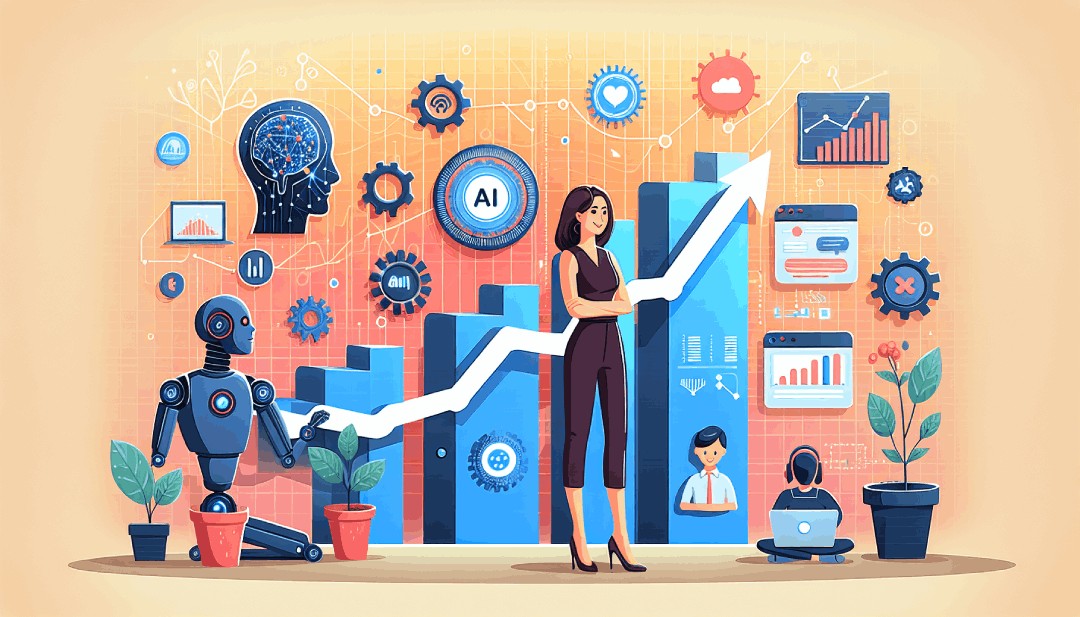However, while digital marketing tools, cloud-based software platforms, and social media networks can all be helpful for entrepreneurs looking to grow their businesses, (AI) is quickly emerging as a powerful tool in the quest for success.
AI-powered solutions are helping small business owners save time by automating repetitive processes; tracking customer behavior and analytics data more accurately; optimizing their personnel costs; developing better products faster; deploying pricing strategies that maximize growth opportunities; strengthening security measures in both physical goods handling and online payments processing―all without sacrificing profitability.
In this blog post, we’ll explore how AI is revolutionizing the way entrepreneurs can manage and operate their businesses with unprecedented efficiency!
Understanding the Basics of AI and Its Use in Entrepreneurship
Artificial Intelligence (AI) is rapidly transforming various aspects of our lives, from healthcare to finance and even entrepreneurship. AI technologies have the potential to revolutionize the way we think about business, allowing us to create innovative solutions that will help entrepreneurs and startups succeed.
Machine Learning
Machine learning technology enables computers to learn and improve on their own through data analysis. This technology can be used to automate complex tasks such as data mining, customer segmentation, and marketing campaigns.
Natural Language Processing (NLP)
NLP technology allows computers to understand natural languages, such as spoken words or written texts. This technology can be used for customer service applications or automated chatbots.
Voice Recognition
Voice recognition technology can recognize different accents or languages and can be used for interactive applications such as virtual assistants or speech-to-text translation services.
Data Analytics
AI-powered data analytics tools allow businesses to quickly analyze large datasets and uncover patterns that could reveal new insights into customer behavior or market trends. This information can then be used by entrepreneurs to make better decisions about rebranding examples, product design, pricing strategies, or marketing tactics.
Analyzing Customer and Market Data with AI
Small businesses can leverage artificial intelligence (AI) to analyze customer and market data and gain a competitive advantage. I can say that AI-powered analytics tools allow small businesses to quickly and accurately process large amounts of data, identify trends or patterns that would be invisible to the human eye, and make better decisions about product development, pricing strategies, or marketing tactics.
Automated Insights
AI-powered automated insights can be used to generate real-time reports on customer behavior or market trends. These insights can help small businesses make informed decisions about their products, services, or marketing campaigns.
Predictive Analytic
Predictive analytics tools use machine learning algorithms to predict future outcomes based on past data. This technology can be used by small businesses to identify new opportunities for sales growth or cost savings.
Customer Segmentation
AI-driven customer segmentation tools allow businesses to automatically group customers into specific categories based on their demographics or behaviors. This information can then be used to develop more personalized marketing campaigns and increase conversion rates.
Automated Processes for Quicker and More Efficient Business Solutions
Process automation is a powerful tool for businesses looking to streamline their operations and increase efficiency. By leveraging the power of artificial intelligence (AI), businesses can automate processes that would otherwise be done manually, saving time and money. Automated processes allow businesses to quickly and accurately complete tasks such as data entry, customer service, inventory management, and more.
The use of AI in process automation has revolutionized the way businesses operate. AI-driven automation solutions can learn from experiences and adapt to changing conditions to optimize performance. This allows businesses to automate complex tasks with minimal effort, while still ensuring accuracy and quality control. Additionally, automated processes can be scaled up or down depending on the needs of the business, allowing them to save money on labor costs while still meeting their goals.
Automated processes also provide businesses with increased visibility into their operations. By tracking data points such as customer interactions, inventory levels, and production circle, AI-driven solutions can give businesses an accurate picture of how their operations are running at any given time. This helps them identify areas where they could improve efficiency or reduce costs by streamlining processes or eliminating redundant steps.
Leveraging AI to Speed Up Decision-Making and Improve Productivity
A key factor in the success of small businesses is their ability to make decisions quickly and act on them efficiently. However, manual processes can often be slow and cumbersome, leading to wasted time and resources. Artificial intelligence (AI) can help small businesses overcome these obstacles by speeding up decision-making and improving productivity.
AI technology can automate tedious tasks such as data entry or customer service, freeing up valuable time for employees to focus on more important tasks. AI systems can also help small businesses make better decisions faster by leveraging their powerful data processing capabilities. By automating data analysis, AI enables businesses to quickly identify trends or uncover insights from large data sets without needing a team of experts to handle the work manually. This means that businesses can make decisions with confidence, knowing that they have a wealth of reliable information at their fingertips.
Small business owners can also leverage AI technology to boost productivity through automated workflow management. By using an automated system, business owners can save time by eliminating manual processes such as assigning tasks or tracking progress. Automated workflow management also ensures that tasks are completed accurately and on schedule. This reduces the risk of human error while allowing business owners to focus on more high-level activities such as strategizing or brainstorming new ideas.
Developing AI-Powered Strategies to Increase Revenue and Profits
Small businesses face unique challenges when it comes to increasing revenue and profits, but the use of artificial intelligence (AI) can provide an effective solution. AI-driven strategies can empower small businesses to identify potential growth opportunities and unlock new sources of revenue.
AI-driven analytics can help small businesses uncover lucrative areas for expansion by identifying customer trends or observing market changes. By analyzing large data sets, AI systems can quickly identify patterns or opportunities that may have gone unnoticed before. This enables business owners to focus their efforts on activities that will generate the greatest returns and achieve their desired goals faster.
AI technology is also invaluable in helping small businesses boost sales and increase profits through targeted marketing campaigns. By leveraging its powerful data processing capabilities, AI can analyze customer behavior and automatically adjust marketing messages for maximum effectiveness. This reduces the time spent manually creating campaigns while allowing business owners to tailor each message specifically for their target audience.
In addition, AI-powered chatbots can offer a cost-effective way for small businesses to provide 24/7 customer support without the need for additional personnel. Chatbots can respond more quickly than human agents, allowing customers to have their questions answered quickly without waiting on hold. This not only improves customer satisfaction with the business but also reduces labor costs associated with manual phone support services.
Overall, using AI-driven strategies is an effective way for small businesses to increase revenue and profits while streamlining operations at the same time. By leveraging its powerful data processing capabilities and automated solutions, small business owners can make smarter decisions faster and take advantage of opportunities they may have otherwise missed.
Examples of Successful Companies Using AI to Grow Their Businesses
As artificial intelligence (AI) continues to become more prevalent in the business world, many companies have seen success by incorporating AI into their operations. Companies such as Amazon, Google, Apple, Meta, Microsoft, and IBM have all been able to leverage AI technology to improve their businesses.
For example, Amazon has used AI to develop its Alexa voice assistant and automated delivery systems. Google has used AI for its search engine algorithms and natural language processing. Apple has incorporated AI into its products, such as Siri and facial recognition software. Meta has used AI for augmented reality applications. Microsoft has used AI for its Azure cloud computing platform and Cortana virtual assistant. Finally, IBM has leveraged AI for its Watson cognitive computing platform.
These companies demonstrate that there are a variety of ways that businesses can use AI technology to grow their operations. By leveraging the power of machine learning algorithms, businesses can gain insights from data faster than ever before and automate processes that would otherwise require manual labor. As a result, companies can increase efficiency while reducing costs associated with labor and overhead expenses.
Source:






